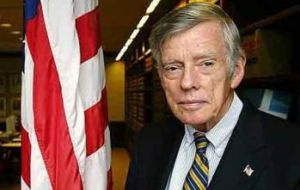MercoPress. South Atlantic News Agency
Argentine central bank reserves dispute adds another player: New York Judge
 Judge Thomas Griesa placed an embargo on Argentine Central Banks accounts in the US
Judge Thomas Griesa placed an embargo on Argentine Central Banks accounts in the US Argentina’s central bank reserves dispute suffered an expected escalation when on Tuesday Judge Thomas Griesa from New York State placed an embargo on Argentine central bank accounts held in the United States, following a lawsuit filed by investment funds (or “vulture funds”).
The embargo is for 1.7 million US dollars in favour of the vulture funds but Central Bank president Martin Redrado immediately contacted lawyer John Newhouse from the New York law firm Sullivan and Cromwell to file an appeal first thing Wednesday morning.
In Buenos Aires, President Cristina Fernandez de Kirchner, Economy minister Amado Boudou and cabinet chief Anibal Fernandez went on a blitzkrieg in several fronts claiming Redrado, Vice-president Julio Cobos and Judge Sarmiento who reversed decrees sacking Redrado and allowing the creation of a 6.5 billion USD fund with bank reserves, were openly conspiring to bring down the government.
However the irony of the matter is that on sacking Redrado and creating a special fund to pay Argentine pending debts, to the eyes of Judge Griesa (if the two initiatives advance) the Argentine Central bank is no longer an autarchic institution, it is under Treasury control and therefore its assets liable to be embargoed as effectively happened, on a stand by condition.
Vulture funds are believed to have billions of US dollars in “hold-out” defaulted bonds with which they speculate expecting to cash at any opportunity. It is estimated 20 billion US dollars in Argentine sovereign bonds did not adhere to the restructuring process of 2005. Judge Griesa is known not to sympathize with vulture funds.
The fact is the cash-strapped Argentine government needs fresh money to pay 2010 commitments and came up with the idea of a Bicentennial Fund to be nourished with 6.5 billions of the 48 billion USD Central bank reserves, with which to reach an agreement with the Paris Club (sovereign to sovereign debt) and the hold outs. This theoretically would normalize Argentina’s credit situation and enable it to access voluntary money markets at reasonable rates without the risk premiums included.
Last week Redrado refused to hand over the funds alleging (correctly) the initiative needs congressional consultation, and was sacked by a presidential decree. But an administrative judge reinstated him and in a similar appeal, from Congress opposition groups. the funds transfer was blocked.
President Cristina Kirchner at a press conference attacked Redrado and described him a “squatter.” She went deeper in the matter: “How can someone explain that a former leader of a Central Bank has become a squatter?”
Besides, she qualified José María Sarmiento as a “delivery judge”. Mrs. Kirchner summed up: “Opposition leaders come up to her, request her anything and she gives it to them”.
She also attacked Vice president Julio Cobos with whom she has not talked or consulted for months, saying that “he is seeking ways to seize power before his term of office is finished”.
Vice-president Cobos is trying to reach an understanding with congressional leaders to convene the legislative currently in recess until March.
Earlier in the afternoon Economy Minister Amado Boudou minimized the embargo saying it “only totals 1.7 million“ and assured that the freeze is ”damaging“ Argentina's plans to carry out a debt swap later this month.
Boudou assured that the Kirchner government will defend the currency's value and that they ”want to assure an economic independence for the country.“ The minister added that ”every measure that we've taken, including the creation of the Bicentennial Fund, were useful to make the country-risk drop 60 percent and titles 35-50 percent.”
At the same time cabinet Chief Anibal Fernandez is believed to have asked a Recess Court to interfere in the case of the removal of Martín Redrado from the head of the Central Bank and the use of federal reserves which was being treated so far by Judge Sarmiento. The case lodged by the government before the Recess Chamber implies skipping a level of usually followed proceedings.
As a direct consequence of the current situation Argentine bonds and the stock market lost ground and the country’s risk again soared.




Top Comments
Disclaimer & comment rulesCommenting for this story is now closed.
If you have a Facebook account, become a fan and comment on our Facebook Page!